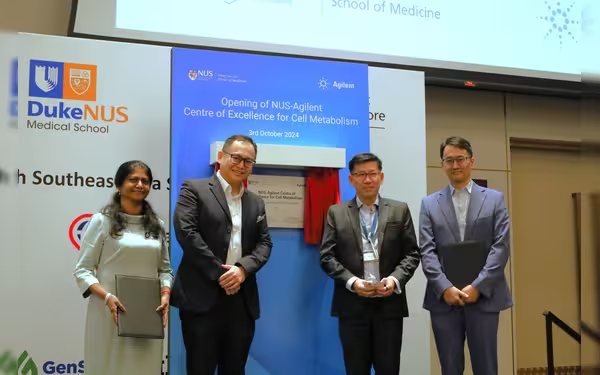Saturday, November 16, 2024 09:30 PM
Agilent and NUS Collaborate to Establish Center of Excellence in Cell Metabolism
- Agilent partners with NUS for health research.
- New center focuses on metabolic diseases.
- Collaboration aims to improve public health outcomes.
 Image Credits: prnewswire_apac
Image Credits: prnewswire_apacAgilent and NUS launch a Center of Excellence in Cell Metabolism to enhance research on metabolic diseases and improve public health.
In recent years, the importance of understanding cell metabolism has become increasingly clear, especially in the context of public health. Metabolism refers to the chemical processes that occur within a living organism to maintain life, and it plays a crucial role in how our bodies function. With rising rates of cardiovascular and metabolic diseases worldwide, there is a pressing need for innovative research that can lead to better health outcomes for populations.
On October 4, 2024, Agilent Technologies Inc. announced a significant partnership with the National University of Singapore (NUS). This collaboration, which will be conducted through the Yong Loo Lin School of Medicine, aims to establish the NUS-Agilent Center of Excellence (CoE) in Cell Metabolism. This center is set to focus on advancing research related to cardiovascular and metabolic diseases over the next four years.
The NUS-Agilent CoE will enable both targeted and untargeted metabolic profiling. This means that researchers will be able to analyze large groups of people to understand how their metabolism works and how it can be influenced by various factors, such as diet, lifestyle, and genetics. By studying these large-scale cohorts, scientists hope to uncover valuable insights that can lead to improved health strategies and interventions.
This partnership is particularly exciting because it combines the expertise of Agilent, a leader in life sciences and diagnostics, with the academic prowess of NUS, one of Asia's top universities. Together, they aim to bridge the gap between laboratory research and real-world applications, ultimately benefiting public health.
As we look to the future, the establishment of the NUS-Agilent Center of Excellence in Cell Metabolism represents a promising step towards tackling some of the most pressing health challenges of our time. By focusing on metabolic health, this collaboration not only aims to enhance scientific understanding but also strives to improve the quality of life for individuals affected by metabolic and cardiovascular diseases. It is a reminder that through collaboration and innovation, we can work towards a healthier future for all.













